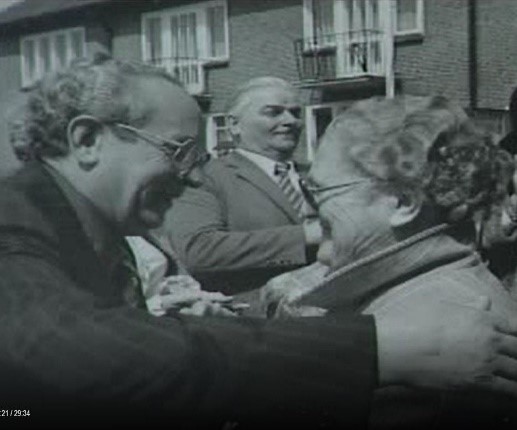Gersh Rachmeliuk was born in 1920 in the town of Lyubar in northwestern Ukraine, as Zvi Rachmeliuk; he was called Hersh by the townspeople, while the official Soviet documents gave his first name as Grigorii. His father was a tailor. Hersh attended a cheder. In 1930, the family moved to the Crimea, hoping to become agriculturalists. However, in 1934 the Rachmeliuks returned to Lyubar, and in 1936 they tried to settle in Birobidzhan. Their Birobidzhan affair lasted all of three weeks, whereupon they returned to Lyubar [YVA O.93/5913]. In 1939, Hersh was drafted into the Red Army. He was sent to the Soviet Far East, where he was attached to the 47th Separate Construction Battalion. In reality, he and his comrades were workers in military uniforms, rather than soldiers. Instead of construction work, the young conscripts were used to load railway cars at a local railway junction.
In the spring of 1940, Rachmeliuk's military unit was put on alert, and seven days later they found themselves in Leningrad (present-day St. Petersburg). There, their commanders told them that they were going to "liberate" Estonia. In June 1940, Rachmeliuk arrived in the port of Haapsalu in western Estonia, and from there his unit was transferred to the island of Hiiumaa (Dago in German) in the Baltic sea. On June 22, 1941, the Soviet-German War began; Rachmeliuk and his comrades had to defend the Moonsund archipelago. The Germans took over the main island of Saaremaa (Ösel) in September 1941, and Rachmeliuk was wounded there for the first time; the Germans occupied the island of Hiiumaa in October 1941, and he received his second wound there. Senior sergeant Grigorii Rachmeliuk failed to evacuate, and was taken prisoner by the Germans. He was held in a POW camp in Riga, Latvia, where he was registered as Grigorii Gavriliuk, a Ukrainian. In November-December 1941, he and other inmates were taken to the Rumbula Forest near Riga, where the Nazis had shot the city's Jews; the POWs had to cover the mass graves with earth. Thus, Rachmeliuk became a witness to the Holocaust
In March 1942, Rachmeliuk and the other POWs were transported by train to Germany and placed in a camp in Sörup, near Flensburg, which distributed workers among German farmers. Rachmeliuk was given to an old German farmer, to work as a farmhand. A fellow POW from the same camp, who knew "Grigorii" personally, denounced him as a Jew to the second farmhand at the farm, a POW from Western Ukraine – and through him, to the German farm owner. The latter was scared; he told Rachmeliuk that he had nothing against the Jews – before the Nazi seizure of power, he had enjoyed good relations with Jews; however, if that lad were to denounce "Grigorii" to the Gestapo, both "Grinka" (Grigorii) and his German employers might suffer. The farmer asked him to settle the unpleasantness. Rachmeliuk came to the camp, revealed his origins to the Russian inmates of his barrack, and laid out the situation. His comrades came to the farm and told the Western Ukrainian farmhand that, if he were to betray Grigorii, they would kill him. The conflict was settled.
Rachmeliuk went on to work for the German farmer for three years, from May 1942 to May 1945. Despite being well aware of his Jewishness, the farmer not only did not betray him, but actually treated him like a human being. Their relations were so good that Rachmeliuk eventually came to address his employer as Opa (German for "grandpa"), and his wife as Oma (German for "granny"). Rachmeliuk told the farmer and his wife about the mass murder of the Jews of Riga that he had witnessed. He recalls that the farmer wept, but said:
"Grinka, since it is you who have told me this, I believe you". 1
At the end of the war, the farmer suggested that Rachmeliuk stay in Germany and marry his granddaughter Elfriede, becoming a farm owner. Rachmeliuk declined the offer, since he wanted to find out what had happened to his parents and sister.After V-E Day, Rachmeliuk was screened by SMERSH (a Soviet military counter-intelligence agency), and then continued his service in the Red Army. In late 1945, he returned to Lyubar, only to learn that his parents and sister had been murdered by the Nazis. Whereas the Red Army believed his claim that he had not collaborated with the enemy, the local MGB (KGB) did not. Rachmeliuk was arrested in Lyubar several times, being released each time after bribing the "security" organs. Rachmeliuk was eventually forced to leave Lyubar for Kiev, where he worked in the administrative apparatus.
In 1973, Rachmeliuk immigrated to Israel. After telling his life story, he was shocked to learn that the Israelis regarded him as a "traitor" and a "collaborator" – just as the Soviets had. In 1975, he moved to the USA, first living in Baltimore, and then settling in Los Angeles. In 1982, Rachmeliuk visited Germany and reestablished contact with the family of the farmer who had saved his life.
- 1. YVA O.93/5913]







